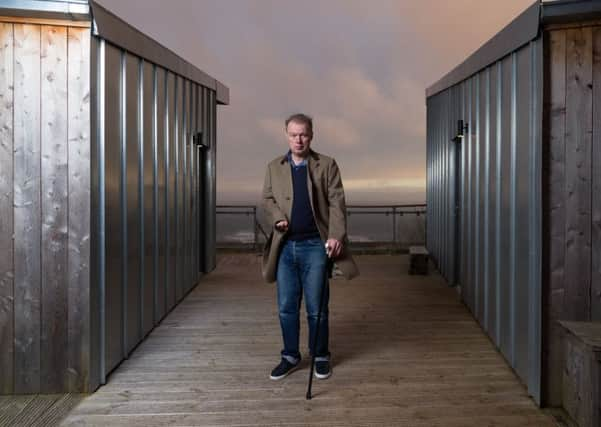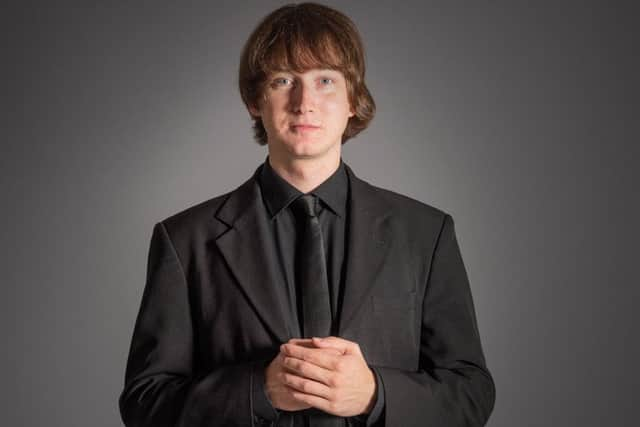Album reviews: Edwyn Collins | Steve Earle | Beth Gibbons | Alexander Ullman | Tom Bancroft’s In Common


Edwyn Collins: Badbea (AED) ****
Steve Earle: Guy (New West Records) ***
Beth Gibbons & the Polish National Radio Symphony Orchestra: Gorecki Symphony No.3 (Domino) ****


These days, Edwyn Collins is always moving forwards, advancing his recovery from two life-threatening strokes in 2005, producing a fertile seam of new music and, in the six years since his most recent album, Understated, moving home and recording studio wholesale to his family’s bolthole in Helmsdale, Sutherland, from where he has produced Badbea in his newly minted Clashnarrow Studios.
Advertisement
Hide AdAdvertisement
Hide AdCollins is pictured beside his new creative home on the sleeve of the album, which is named after an abandoned clifftop village five miles from Helmsdale but, in the move from his former London base to the north east of Scotland, he unearthed some old lyric books from before his stroke and, for once, has permitted himself to look backwards.
Glasgow to London is the most nostalgic moment on the album as Collins recalls a very different flit between north and south, the necessary commutes of his Orange Juice days and his snotty attitude to his paymasters in the big smoke. There’s no hand-wringing here though as he chants “it’s in the past”.
He also cuts his younger, cockier self some slack on I Guess We Were Young, a romantic rock’n’roll twang with mariachi trumpet and Morricone whistling.
But elsewhere, the past is simply a sonic landscape from which to draw – the pugnacious garage punk of recent single Outside, for example, or the northern soul stomper In the Morning, which is only one of numerous tracks on which Collins unleashes his new signature fuzz pedal, mischievously named the Bum Fuzz.
Just as strong are the more introspective moments such as the resonant requiem of the title track and the luminous croon It All Makes Sense to Me, a very touching paean to contentment enhanced with the background birdsong of a thrush singing outside the studio.
Ten years ago, Steve Earle released Townes, a tribute to his late friend and teacher Townes Van Zandt. Now he pays similar homage to his other great songwriting mentor, Texan troubadour Guy Clark, who passed away in 2016.
Earle played bass in Clark’s band in the mid-70s so it’s no surprise that he is embedded in the grizzly country blues of Desperadoes Waiting for a Train, a song about a younger man recalling his older buddy.
Across 16 tracks, he and his band The Dukes celebrate Clark’s extensive oeuvre from spirited country rocker Out in the Parking Lot to soulful lament She Ain’t Going Nowhere to sprightly bluegrass hoedowns Sis Draper and New Cut Road.
Advertisement
Hide AdAdvertisement
Hide AdThe sparsely rendered Last Gunfighter Ballad is as eloquent as his own Devil’s Right Hand and he bows out on the tearjerking Old Friends with vocal support from a gathering of fellow Clark cohorts and contemporaries including Emmylou Harris and Rodney Crowell.
Opportunities to hear the spectral blues tones of Portishead frontwoman Beth Gibbons are limited these days but it is somehow appropriate that her first new utterance in over a decade is a recording of a 2014 performance of Gorecki’s Symphony No.3 with the Polish National Radio Symphony Orchestra, conducted by Krysztof Penderecki.
Familiar from its use on film soundtracks, the Symphony of Sorrowful Songs is based on a trio of Polish texts, assiduously delivered in soaring vibrato by Gibbons, who has the vocal control to hold those trembling legato notes as well as the emotional guts to interpret a 15th century lament as Mary, mother of Jesus, a message written on the wall of a Gestapo prison and a folk song dating from the Silesian uprisings of the early 20th century. This last movement is the most haunting but the entire symphony is an indulgent wallow in wilting strings. - Fiona Shepherd
CLASSICAL
Alexander Ullman: Russian Ballet Classics on Piano (Rubicon) *****
If concert piano performance is about flamboyance and pyrotechnics, Alexander Ullman is a master of the art. The British-born pianist, who studied at the Purcell School and Curtis Institute, and who won the 2017 Franz Liszt International Piano Competition, exercises his prodigious talent in this fiery album of Russian ballet transcriptions.
It’s the effortlessness of these performances that makes them so enjoyable.
He starts with Tchaikovsky’s Nutcracker Suite, each of its scenes brought crisply to life in lucid, colourful interpretations. Then it’s Stravinsky, and the rustic effervescence of the Three Movements from Petrushka. Prokofiev’s grace and wit are paramount in the Six Pieces from Cinderella, and Ullman ends with Guido Agosti’s swashbuckling transcription of Stravinsky’s The Firebird. - Ken Walton
JAZZ
Tom Bancroft’s In Common: Love & Stillness (Interrupto Music) ****
Advertisement
Hide AdAdvertisement
Hide AdThis fusion of jazz, Indian and occasional Scots traditional music follows through a collaboration between two well-known Scots jazz figures – drummer Tom Bancroft and guitarist Graeme Stephen – and Delhi violinist Sharat Chandra Srivastava and tabla player Gyan Singh, with vocals from Sophie Bancroft, Gina Rae and Inge Thomson. At times reminiscent of Sixties Indo-rock fusioneers Quintessence or the later Indian Ocean, this is vividly colourful music, the opening Somehow Something somewhere between Indian chant and nursery rhyme, while the 9/8 pipe tune Donald Willie and His Dog is scarcely recognisable, subsumed into rich, Shakti-like guitar and violin deliberations over bodhran flurries. Monotone chanting does nothing for Burnin o Auchindoon, but a highlight is Flower Child, with its guitar and violin prelude shifting into Bancroft-beaty mode and powerful guitar work from Stephen. - Jim Gilchrist